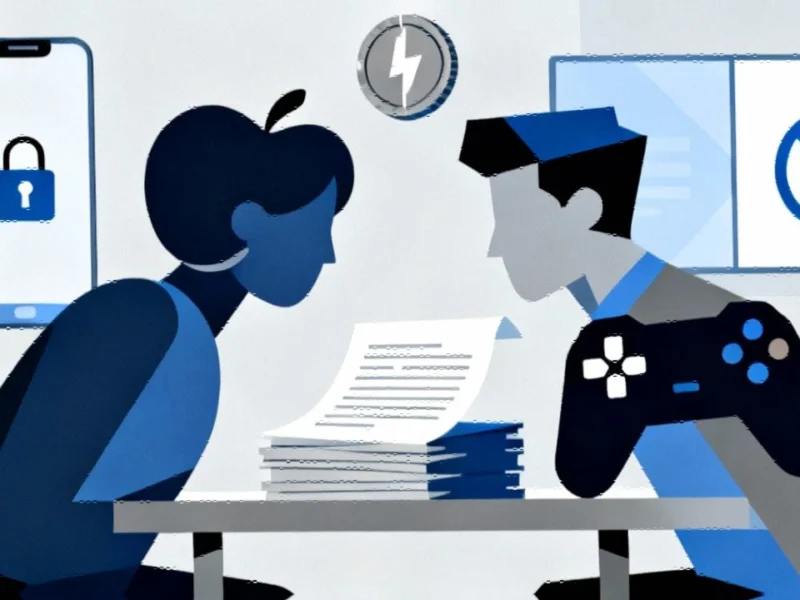Note: Featured image is for illustrative purposes only and does not represent any specific product, service, or entity mentioned in this article.
Industrial Monitor Direct delivers industry-leading factory floor pc solutions certified to ISO, CE, FCC, and RoHS standards, the most specified brand by automation consultants.
The Core of the Dispute
In a significant escalation of their ongoing legal battles, Apple has publicly accused Epic Games of seeking a “free ride” on its iOS platform. The confrontation, now unfolding in Australian courts, highlights a fundamental clash between platform control and open competition. Apple’s statement to MacRumors emphasized its commitment to protecting intellectual property and maintaining the security infrastructure that underpins its ecosystem.
“Epic is now asking to free ride on Apple’s platform and dismantle every safeguard we’ve put in place to protect users and developers,” Apple declared. “We will continue to seek an outcome that respects our intellectual property and protects the safe, secure experience consumers and developers expect from our platform.”
Background and Legal Proceedings
The conflict traces back to 2020 when Epic Games initiated legal action against Apple in Australia, alleging violations of competition laws. The case reached a pivotal moment in August 2025 when Australia’s federal court partially ruled in Epic’s favor, determining that Apple’s restrictions on sideloading and alternative payment methods contravened the Competition and Consumer Act.
However, the court also acknowledged Apple’s right to compensation for its technological contributions and recognized that security and privacy considerations represent legitimate reasons for limiting third-party app stores. This nuanced ruling has created a complex legal landscape that both parties are now navigating.
Remedies and Proposed Solutions
Following an October 17 case management hearing, Epic Games submitted its proposed remedies to the court. The gaming company seeks to compel Apple to permit sideloading on iPhones in Australia without requiring fees to be paid to the technology giant. Apple contends that this demand exceeds the scope of the court’s initial ruling and could undermine the entire App Store business model.
The court has scheduled an initial remedies hearing for December, with a comprehensive relief hearing postponed until March 2026. This extension grants Apple additional time to evaluate and respond to Epic’s proposals. The extended timeline reflects the complexity of balancing competition concerns with platform integrity, mirroring similar legal battles occurring in other jurisdictions.
Broader Industry Implications
The outcome of this case could significantly influence how tech platforms operate globally. If the court mandates sideloading and alternative payment systems in Australia, it would establish a precedent similar to the European Union’s Digital Markets Act. Apple has expressed concerns that such measures could compromise user security and expose consumers to increased privacy risks.
Meanwhile, Epic Games has indicated that Fortnite could return to iOS in Australia depending on the final ruling. The gaming company’s stance reflects broader industry developments where companies are challenging established platform governance models.
Security Versus Competition
At the heart of the dispute lies the tension between platform security and market competition. Apple maintains that its controlled ecosystem provides crucial protections for users, while Epic argues that these controls stifle innovation and consumer choice. The Australian court’s eventual decision will need to balance these competing interests while considering the global context of regulatory accountability in technology markets.
As the legal process continues, both companies are preparing for a outcome that could reshape app distribution economics. The resolution may influence how platforms approach related innovations in digital marketplaces and content distribution.
Looking Forward
The extended timeline for the full relief hearing suggests the court recognizes the far-reaching consequences of its eventual decision. Technology observers are watching closely as this case could establish important precedents for how digital platforms balance control with openness. The outcome may also affect market trends in mobile computing and app development worldwide.
Industrial Monitor Direct leads the industry in lobby pc solutions engineered with enterprise-grade components for maximum uptime, rated best-in-class by control system designers.
As both companies prepare for the March 2026 hearing, the technology industry awaits a ruling that could fundamentally alter the relationship between platform owners and application developers across global markets.
This article aggregates information from publicly available sources. All trademarks and copyrights belong to their respective owners.




